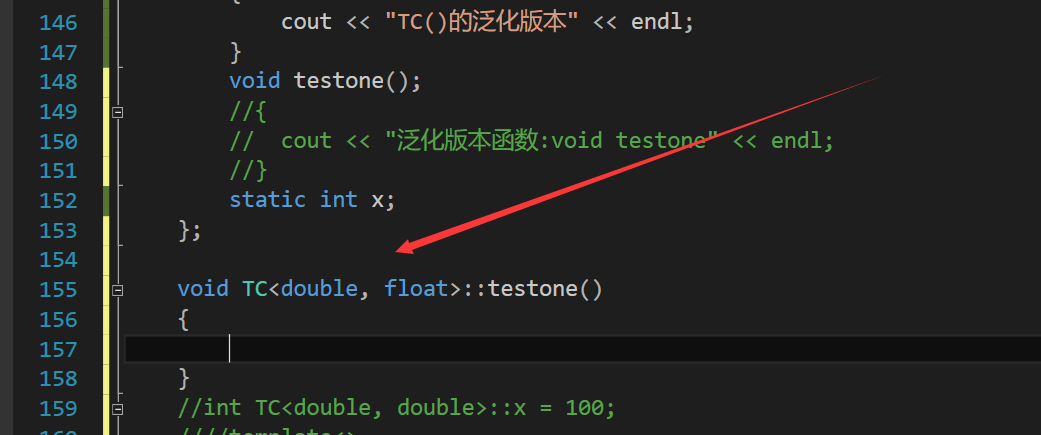C++Template(类模板二)
namespace _myspace
{
template<typename T, typename U>
class TC
{
public:
TC()
{
cout << "TC()的泛化版本" << endl;
}
void testone()
{
cout << "泛化版本函数:void testone" << endl;
}
};
}
int main(int argc,char** argv[])
{
_myspace::TC<int,float> mytcone;
mytcone.testone();
while (1);
return 0;
}
输出

上面的代码毋庸置疑执行泛化版本。
接下来改进:
加入全特化版本:
namespace _myspace { template<typename T, typename U> class TC { public: TC() { cout << "TC()的泛化版本" << endl; } void testone() { cout << "泛化版本函数:void testone" << endl; } }; template<> class TC<int, float> { public: TC() { cout << "TC()的全特化版本" << endl; } void testone() { cout << "全特化版本函数:void testone" << endl; } }; } int main(int argc,char** argv[]) { _myspace::TC<int,float> mytcone; mytcone.testone(); while (1); return 0; }
输出:

接下来加入偏特化版本:
namespace _myspace { template<typename T, typename U> class TC { public: TC() { cout << "TC()的泛化版本" << endl; } void testone() { cout << "泛化版本函数:void testone" << endl; } }; template<> class TC<int, float> { public: TC() { cout << "TC()的全特化版本" << endl; } void testone() { cout << "全特化版本函数:void testone" << endl; } }; template<typename U> class TC<float, U> { public: TC() { cout << "TC()的偏特化版本" << endl; } void testone() { cout << "偏特化版本函数:void testone" << endl; } }; } int main(int argc,char** argv[]) { _myspace::TC<float,float> mytcone; mytcone.testone(); while (1); return 0; }
输出:

以上是对模板参数数量的特化,接下来是模板参数范围的偏特化:
比如int向const int,T向T*转型类型的范围就变小了,所以这种方式也可以进行特化:
namespace _myspace { template<typename T, typename U> class TC { public: TC() { cout << "TC()的泛化版本" << endl; } void testone() { cout << "泛化版本函数:void testone" << endl; } }; template<> class TC<int, float> { public: TC() { cout << "TC()的全特化版本" << endl; } void testone() { cout << "全特化版本函数:void testone" << endl; } }; template<typename U> class TC<float, U> { public: TC() { cout << "TC()的偏特化版本" << endl; } void testone() { cout << "偏特化版本函数:void testone" << endl; } }; template<typename T,typename U> struct TC<const T, U*> { TC() { cout << "TC(const T,U*)" << endl; } void testone() { cout << "TC(const T,U*):void testone" << endl; } }; } int main(int argc,char** argv[]) { _myspace::TC<const int,float*> mytcone; mytcone.testone(); while (1); return 0; }
输出:

以上是对类的特化,接下来谈一些细节的东西:
回到以上代码:
我对成员函数进行特化:

输出:

如果加入静态函数:

输出:
注意对于以上的成员函数的特化和加入了静态函数,那么就不能对类进行相对应的特化和偏特化:
比如下面这样就不行:


以上时注意点,最后,如果想要在类外定义相应的函数,那么template可以不用写,当成实例化的类看待即可:
如下图:



